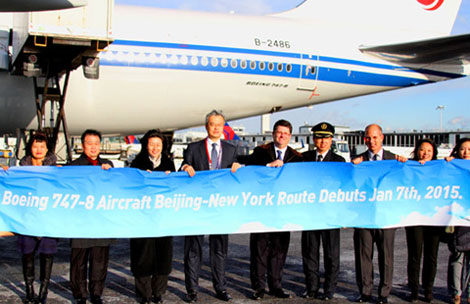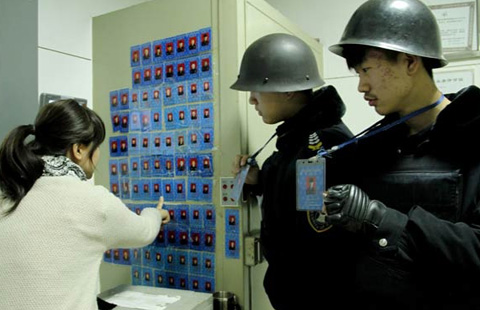Firm can get past meat scandal: experts
Updated: 2015-01-09 13:32
By Amy He in New York(China Daily USA)
|
||||||||
Although a US-based food processing company involved in an expired-meat scandal in China last year is "very disappointed" with a Shanghai FDA report about its products, industry experts said the company can weather the crisis.
The Shanghai Food and Drug Administration announced on Jan 5 that it had destroyed expired meat totaling 521.2 metric tons from the Shanghai Husi Co. a division of the Auora, Illinois-based OSI Group LLC.
"Shanghai Husi is very disappointed to see that the Shanghai FDA has made a media statement claiming that our relevant products (raw or partially cooked products requiring further cooking before consumption) have been defined as 'questionable products,' " it said in a Jan 5 statement.
"We view this (Shanghai FDA) statement to be very misleading, as its use does not meet the definition of 'questionable products' as set forth by the China Food and Drug Administration (CFDA)," the company said.
OSI said that its Shanghai unit had worked hard to cooperate with local authorities, withdrawing products from the market to ease public concern and cooperating with the FDA.
"Once we've had the opportunity to thoroughly review the government report after its release, OSI China will take whatever steps are necessary to ensure that all of its products continue to be high-quality, safe and wholesome," it said.
David Acheson, chief executive at food consultancy Acheson Group, said that the Shanghai authorities' actions were routine and that calling the product questionable was not the same as calling it problematic.
"I believe that if they put robust processes and systems in place, they can get back just fine," he said.
"The FDA determined that this product is questionable, and they didn't call it 'unsafe.' They clearly are not going to put it back into circulation and reuse it, so their only option is to destroy it," Acheson said.
"If China's FDA had knowledge, science and information to say that it was an adulterated product, they would have said it," he said. "They would have said 'adulterated', they would have said 'contaminated', they would have said 'unsafe'. They kind of used somewhat of a neutral term, which characterized it fairly accurately."
Gary Karp, executive vice-president at food services research firm Technomic, said it is routine to dispose of products that had been unused for months, and that local authorities would not be able to justify using the products again.
OSI's troubles began when local media had documented employers at Shanghai Husi -which provides food to McDonald's, KFC, Pizza Hut and Starbucks - forging production dates and using expired meat.
The company then ceased operations at the Shanghai plant in order to work with authorities on an investigation into the food quality. It changed the structure and management of the China division, incorporating the branch into the US rather than it operating as a separate entity.
Several US companies that worked with OSI cut ties with the food supplier, and six of OSI China's employees were arrested.
Karp said that despite the bad press the last few months, he expects OSI to recover in China.
"I think that OSI absolutely can bounce back," he said. "I think that it's their track record and practices over the course of their entire network that is their strength, and I think that isolated incidents like this - while certainly garnering huge headlines, from a materiality standpoint - does not make OSI a less-quality company."
Melvin Kramer, president of EHA Consulting Group, said: "Crises always negatively impact in the short term. I think OSI is sophisticated and large enough that they will be able to weather the storm."
amyhe@chinadailyusa.com

 Across America Over the Week (Jan 2-Jan 8)
Across America Over the Week (Jan 2-Jan 8)
 No longer 'catching up'
No longer 'catching up'
 Dunkin' Donuts to open 1,400 outlets in China
Dunkin' Donuts to open 1,400 outlets in China
 Air China's new Boeing 747-8 lands
Air China's new Boeing 747-8 lands
 Escort security guards: risky profession
Escort security guards: risky profession
 Fund to pay slain officers' mortgages hits goal
Fund to pay slain officers' mortgages hits goal
 Changing costumes over 60 years in China
Changing costumes over 60 years in China
 9 websites that provide 'haitao' service in China
9 websites that provide 'haitao' service in China
Most Viewed
Editor's Picks

|

|

|

|

|

|
Today's Top News
Shooting in Texas leaves 2 dead, 1 injured
Dunkin' Donuts to open 1,400 outlets in China
Firm can get past meat scandal: experts
China snaps up more iPhones than US
'Hello Moto' again in China
Chinese rank US among top three popular destinations
China's December PPI down 3.3%
Jackie Chan's son sentenced to six months in prison
US Weekly

|

|







